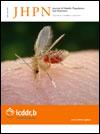Low-dose β-carotene Supplementation and Deworming Improve Serum Vitamin A and β-carotene Concentrations in Preschool Children of Bangladesh
DOI:
https://doi.org/10.3329/jhpn.v28i3.5549Keywords:
Albendazole, Antihelminthics, Ascariasis, Ascaris lumbricoides, ?-carotene, Children, Deworming, Impact studies, Retinol, Vitamin A deficiency, BangladeshAbstract
Despite the national vitamin A and antihelminthic prophylaxis programmes, both intestinal geohelminthsand subclinical vitamin A deficiency continue to be prevalent among children in developing
countries. Studies on potential synergistic effects of vitamin A supplementation and deworming on retinol
status have inconsistent results. The purpose of the present study was to investigate the impacts of low-dose
β-carotene supplementation and antihelminthic therapy on serum retinol and β-carotene concentrations
in preschool children of Bangladesh. Two hundred and forty-four children, known to be infected with Ascaris
lumbricoides, were randomized into four treatment groups: I-IV. Group I and II received two oral doses
of 400 mg of albendazole each, the first dose at baseline and the second dose after four months; Group III
and IV received placebo in place of albendazole. In addition, Group I and III received 1.2 mg of β-carotene
powder in capsule daily for six months, and Group II and IV received placebo in place of β-carotene. Serum
retinol and β-carotene levels were measured before and after six months of the interventions. Serum
retinol and β-carotene increased significantly in Group I where both antihelminthic therapy and daily
β-carotene supplementation were given (p<0.05 and p<0.001 respectively). Antihelminthic therapy alone
only improved serum β-carotene concentration (p<0.0001). Low-dose β-carotene supplementation, along
with an antihelminthic therapy, synergistically improved vitamin A status. This finding has public-health
implications for improving vitamin A status of children in developing countries.
Key words: Albendazole; Antihelminthics; Ascariasis; Ascaris lumbricoides; β-carotene; Children; Deworming;
Impact studies; Retinol; Vitamin A deficiency; Bangladesh
DOI: 10.3329/jhpn.v28i3.5549
J HEALTH POPUL NUTR 2010 Jun;28(3):230-237
Downloads
Download data is not yet available.
Abstract
911
911
PDF
662
662
Downloads
How to Cite
Haque, R., Ahmed, T., Wahed, M., Mondal, D., Rahman, A. H., & Albert, M. J. (2010). Low-dose β-carotene Supplementation and Deworming Improve Serum Vitamin A and β-carotene Concentrations in Preschool Children of Bangladesh. Journal of Health, Population and Nutrition, 28(3), 230–237. https://doi.org/10.3329/jhpn.v28i3.5549
Issue
Section
Original Papers

